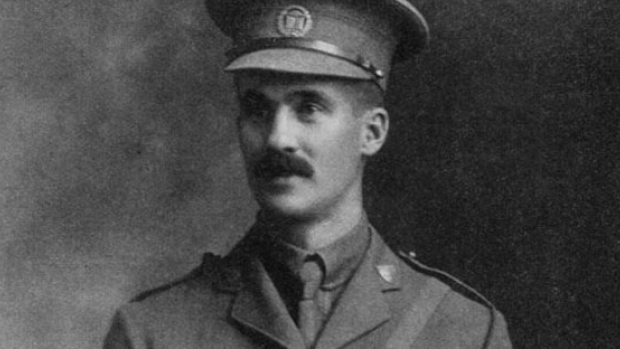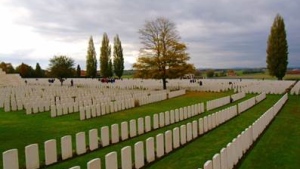Nov 8, 2016
Percival Molson: Star athlete and proud soldier
With Remembrance Day approaching, TSN’s Bob Weeks travelled to Belgium to visit the battlefields and cemeteries of the First World War to profile some of Canada’s top athletes of the day who made the ultimate sacrifice more than a century ago
By Bob Weeks

It is known simply as Molson Stadium and in today’s era of sponsorship naming rights, many may think the home of the Montreal Alouettes is dubbed that because of a payment from the beer company. In truth, the full title is Percival Molson Memorial Stadium, named in honour of a top Canadian athlete of the day who paid the ultimate sacrifice in the First World War.
At the turn of the 19th century, few athletes in Canada were as talented as Percival Molson. A strapping young man who stood just over six feet, he was the grandson of John Molson, who founded the brewery that bears the family name and became one of Canada’s most notable clans. In his life cut short, Percival’s athletic achievements ranged from playing for a Stanley Cup winner to setting a world record in track and field.
Athletic prowess came early to Molson. At just 16, he suited up for the Montreal Victorias who went on to win the 1897 Stanley Cup.
But it was a few years later, while a student at McGill, that Molson stood out. In this era, university sports rivalled professional leagues for both talent and notoriety. Huge crowds would come to see games between schools like McGill, Queens and the University of Toronto, and Molson was usually front and centre.
He captained McGill’s hockey team, played running back for the football squad, and was a success in squash and tennis. He was named the school’s athlete of the year three consecutive times, a record that has never been equalled in the long history of that institution.
Molson was well known for his sportsmanship and devotion to fair play. In one hockey game against Queen’s, after he’d been credited with a goal, he reportedly told the referee that it had gone in off his arm and that it should be disallowed (the rule of those times). The official took him at his word and disallowed the goal.
With all these achievements, it may have been in track and field where Molson excelled most. At a meet in the United States in 1900, he set the world record in the long jump, reportedly leaping more than 24 feet.
In 1903, he won the Canadian championships in the 400 metres, earning a spot on the Canadian team that went to the 1904 Olympics in St. Louis.
A pre-race favourite, Molson, the first McGill student to compete at the Games, didn’t fare well on race day and finished near the back in the field of 12 runners.
By the start of the war, Molson had become the youngest member of McGill’s Board of Governors and was working for the National Trust Company. He was part of a group that helped establish an enlistment organization for students at McGill and other Canadian universities, with more than 1,000 men signing up to become part of the Princess Patricia’s Canadian Light Infantry (PPCLI).

In 1915, at 34, Molson enlisted and after some training, joined the PPCLI as a captain, fighting in Belgium. In the spring of 1916, his unit, part of the Canadian 3rd Division was stationed at Mount Sorrel.
On June 2, a German unit began a steady bombardment that lasted for 24 hours, followed by a full-out attack. They pushed the Canadians back some 1,100 metres and captured the strategic areas of Mount Sorrel and Hill 61, but at that point, the Germans were stopped by the resilient Canucks, including Molson. Not long after, the Canadians were ordered to counterattack, which proved to be a disaster.
During that battle, Molson led his troops in a valiant but ill-fated effort against the now entrenched Germans and was shot in the face. He became one of 8,340 casualties suffered by the 1st, 2nd and 3rd Canadian Divisions in what became known as the Battle of Mount Sorrel at Sanctuary Wood.
Molson was shipped back to England where his jaw was wired shut and he spent long months recovering. For his actions in the battle, he was awarded the Military Cross, one of the highest awards given for gallantry in the field.
Undaunted by the injury, he re-joined his troop in July 1917 and was leading his men in a battle near Vimy, a few months after the Canadians had famously taken the ridge. While moving through the trenches to encourage his soldiers – a rather uncommon practice for an officer, but one that endeared him to his men – he was killed by a direct hit from a German howitzer.
His final resting place is in Villers Station Cemetery in Villers-au-Bois in Pas-de-Calais.
In his will, Molson’s love of McGill came through. He left $75,000 (today worth approximately $1.2 million) for the construction of a football stadium on the campus. On October 25, 1919, it was named after the fallen hero.
Molson’s success on the gridiron was also honoured with his posthumous induction into the McGill Sports Hall of Fame – the hall’s first inductee – and the Canadian Football Hall of Fame.

